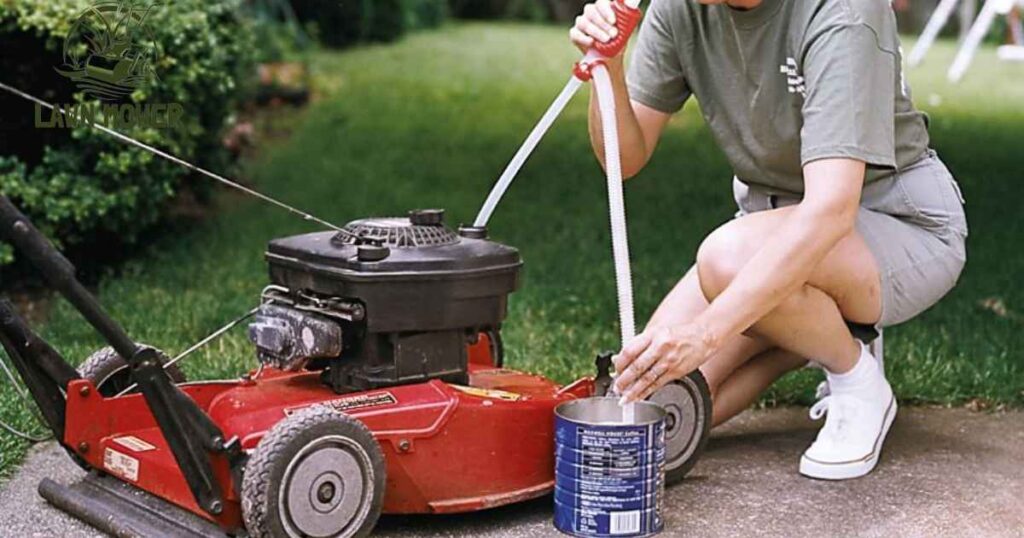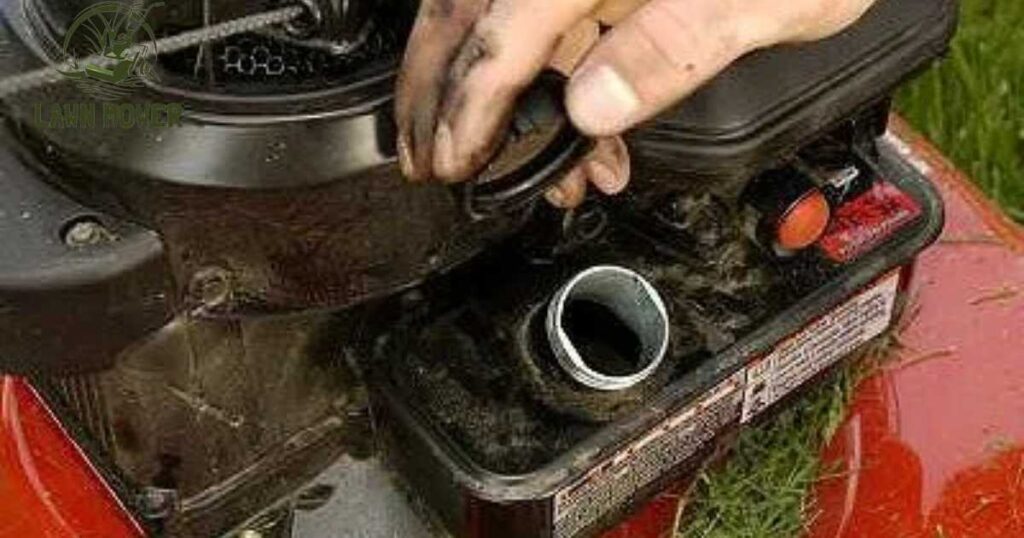Using mixed gas in a lawn mower, a blend of gasoline and oil for two-stroke engines, requires following manufacturer recommendations to prevent damage and warranty voidance. Regularly checking the blade’s sharpness is vital for a clean and efficient cut, promoting lawn health.
Curious about fueling your lawn mower? Before you mix different types of gas, remember that most lawn mowers are designed for a specific fuel type. Putting mixed gas in a lawn mower can lead to poor performance or even damage. Stick to the manufacturer’s recommendations to keep your mower running smoothly.
It’s not advisable to use mixed gas in a lawn mower designed for straight gasoline. Mixed gas, typically used in two-stroke engines, contains oil premixed with fuel. Using it in a regular lawn mower may lead to performance issues and potential damage. Always follow the manufacturer’s recommendations for fuel in your specific lawn mower.
What happens if You Put Mixed Gas in a Lawnmower?

Putting mixed gas in a lawnmower can lead to engine damage and poor performance. The engine may struggle to run efficiently, causing sputtering, stalling, and difficulty starting. The mixture of fuel and oil in mixed gas can result in clogged fuel lines, carburetor issues, and increased carbon deposits, ultimately reducing the overall lifespan of the lawnmower.
Using mixed gas not intended for the lawnmower’s specifications can void the warranty and result in costly repairs. It is crucial to follow the manufacturer’s recommendations and use the correct fuel to maintain the optimal functioning of the lawnmower and ensure a longer, trouble-free service life.
Two-stroke Fuel in a Four-stroke Lawnmower?
Using two-stroke fuel in a four-stroke lawnmower is a common mistake that can lead to serious engine issues. Two-stroke fuel is formulated for engines that require a mixture of oil and gasoline, while four-stroke engines have a separate oil system. Introducing two-stroke fuel to a four-stroke engine can cause inadequate lubrication, leading to overheating and potential damage.
The additives present in two-stroke fuel, such as detergents, can be detrimental to the components of a four-stroke engine. The fuel-to-air ratio also differs between the two types, affecting combustion efficiency. To avoid performance problems and ensure the longevity of your lawnmower, always use the recommended fuel type specified by the manufacturer.
Does Your Lawnmower Need Mixed Gas?

If you have a traditional lawnmower with a 2-stroke engine, it may require mixed gas. These engines rely on a mixture of gasoline and oil for lubrication, typically in a specific ratio like 50:1. It’s essential to follow the manufacturer’s guidelines to ensure proper engine performance and longevity.
On the other hand, most modern lawnmowers use 4-stroke engines, which run on straight gasoline. These engines have a separate compartment for oil, eliminating the need for mixing. Always check your lawnmower’s manual or consult the manufacturer to determine the correct fuel type and ratio, ensuring your lawnmower stays in top condition for a well-groomed lawn.
What is the Best Gas for a Lawnmower?
Selecting the right fuel for your lawnmower is essential for optimal performance. For most lawnmowers, regular unleaded gasoline with an octane rating of 87 is the best choice. This fuel is widely available and strikes a good balance between cost and efficiency.
Avoid using ethanol-blended fuels with a high ethanol content, as they can cause engine damage. Stick to pure gasoline to ensure your lawnmower runs smoothly and stays in good condition. Always consult your lawnmower’s manual for specific fuel recommendations to keep your equipment operating at its best.
How do I know if my lawnmower is two or four-stroke?

To determine if your lawnmower is two or four-stroke, first, check the fuel and oil requirements. Two-stroke engines require a mixture of oil and gasoline, typically in a specific ratio, while four-stroke engines have separate compartments for oil and fuel.
Examine the engine’s design. Two-stroke engines usually have a simpler construction with fewer components, while four-stroke engines feature an oil sump and a more complex internal structure. If you’re still unsure, consult your lawnmower’s manual or the manufacturer’s specifications for a definitive answer.
Disadvantages of Gas with More than 10% Ethanol
| Disadvantages of Gas with More than 10% Ethanol |
| 1. Reduced Fuel Efficiency |
| Higher ethanol content can lead to lower energy density, resulting in decreased miles per gallon (MPG). |
| 2. Corrosion and Deterioration |
| Ethanol can be corrosive to certain materials, potentially causing damage to fuel system components such as seals, hoses, and gaskets. |
| 3. Water Absorption |
| Ethanol has hygroscopic properties, meaning it can absorb water from the atmosphere. This can lead to phase separation and increased potential for engine damage. |
| 4. Cold Weather Performance |
| Ethanol can cause difficulties in cold weather by promoting the formation of ice crystals in the fuel, which can lead to fuel system blockages and starting issues. |
| 5. Engine Compatibility |
| Some older engines and certain small engines, such as those in outdoor power equipment, may not be designed to handle higher ethanol blends, potentially causing damage. |
| 6. Cost and Availability |
| Gasoline with higher ethanol content may be more expensive, and its availability may be limited in certain regions. Additionally, modifications to vehicles may be required to use higher ethanol blends. |
| 7. Environmental Concerns |
| The production of ethanol, especially from certain crops, may have environmental implications, such as deforestation and increased use of pesticides. Additionally, the net environmental benefit of ethanol is a subject of debate. |
| 8. Impact on Older Vehicles |
| Older vehicles, especially those designed before the widespread use of ethanol blends, may experience performance issues and accelerated wear and tear on certain components. |
| 9. Reduced Shelf Life |
| Ethanol-blended gasoline has a shorter shelf life than pure gasoline, which can lead to fuel degradation and engine problems if not used promptly. |
| 10. Limited Energy Content |
| Ethanol contains less energy per unit volume than gasoline, which means more fuel may be required to achieve the same level of performance, offsetting potential cost savings. |
How do you check the gas quality in your lawnmower?

To check the gas quality in your lawnmower, start by examining the fuel in the tank. Ensure it is free from visible debris, water, or discoloration. Clean and clear fuel indicates good quality, promoting optimal engine performance.
Consider using a fuel stabilizer to maintain gas freshness during periods of inactivity. Regularly inspecting and replacing the fuel filter can also contribute to a cleaner fuel supply for your lawnmower, keeping it running smoothly and extending its overall lifespan.
Frequently Asked Questions
Is it okay to run mixed gas in lawn mower?
No, it’s not okay to use mixed gas in a lawn mower unless the manufacturer specifies it. Follow the recommended fuel type mentioned in the mower’s manual to ensure proper functioning and avoid damage.
What happens if you use mixed gas in a 4 stroke engine?
Using mixed gas in a 4-stroke engine can cause poor performance, damage, or even engine failure because the engine is designed to run on a specific fuel mixture. Using the wrong gas may lead to incomplete combustion and harm the engine components.
What happens if you put the wrong fuel in a lawn mower?
If you put the wrong fuel in a lawn mower, it may not start or could get damaged. Using the correct type of fuel recommended by the manufacturer is important to keep the lawn mower running smoothly.
Can you put 2 stroke fuel in a mower?
No, it’s not okay to use 2-stroke fuel in a mower designed for 4-stroke engines. Mowers have specific fuel requirements, and using the wrong type can damage the engine.
Conclusion
It’s not a good idea to put mixed gas in a lawn mower. Lawn mowers are designed to run on specific fuel types, usually regular unleaded gasoline. Using mixed gas, which typically contains oil for two-stroke engines, can lead to poor performance and damage to the mower’s engine.
It’s essential to follow the manufacturer’s recommendations and use the correct fuel to ensure the proper functioning and longevity of your lawn mower.Sticking to the recommended fuel type for your lawn mower is a simple yet crucial aspect of maintenance.
By doing so, you can keep your mower running smoothly and avoid unnecessary repairs or replacements. Always check the user manual or consult the manufacturer for guidance on the appropriate fuel for your specific lawn mower model.

With a wealth of expertise spanning six years, I am a seasoned professional in the realm of lawn mowers. My mastery includes intricate knowledge of models, maintenance, and optimal performance.













